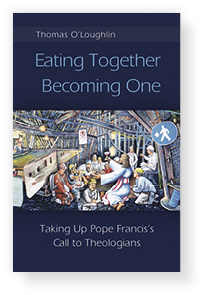WelCom December 2020

Catholics and other Christians thanking God together

A central illusion in most religions is that their beliefs, structures, and rituals are unchanging. They assert a continuity that stretches back into, quite literally, time immemorial. This phenomenon has been studied for more than a century: Mircea Eliade’s notion that religion links people to their mythic original time – in illo tempore – being its most famous description. Theoretically, for monotheists such as Christians, this should not be the case: only the Creator could be beyond time, and since the all else (the creation) is subject to time, change and development should be the norm. Change will only cease at some future, unknown moment. Unfortunately, most Christians slip into thinking their particular focus of attention, usually either ‘the bible’ or a ‘deposit of doctrine,’ is not only immune to change but somehow perfect, and the last word that is to be said on a topic.
One particular bit of doctrine that affects practice that has got stuck in this way (that is, it is repeated rather than reflected upon) is the Catholic Church’s statement that only those they consider in doctrinal agreement with them on the significance of the Eucharist (labelled variously as ‘Holy Communion’, ‘the Mass’, ‘the Lord’s Supper’) can participate fully at its celebration. Put crudely, this means that (1) if you are a Protestant you are not invited to eat or drink at a Catholic service, and (2) a Catholic, even if welcome at a Protestant Eucharist, must refuse to share fully in the meal event by eating and drinking.

This policy of clear blue water between denominations was standard policy for centuries, but with the rise of the ecumenical movement in the twentieth century it seemed out a place. Nonetheless, the Catholic Church, while willing to talk about unity, saw this step as impossible ‘until there was unity of faith’ (that is, doctrinal uniformity) without recognising this approach postpones sharing until the end of time. This matter might seem but a curious ritual detail, except that the very groups involved all see gathering to thank the Father through Jesus as the centre and summit of the worship. Not to share there, casts a doubt and cloud over moves towards unity. This Catholic no-go attitude not only creates deep hurt and tension at official levels in relations between church leaders, but it creates tensions in households every Sunday where partners want to worship together but one or other feels excluded – it is a question that caused hurt to people.
This problem appeared to be easing in the aftermath of the Roman Catholic Church’s Second Vatican Council (1962–1965) but in recent decades under two conservative popes – John Paul II and Benedict XVI – the situation deteriorated again. Indeed, in 1998 the Catholic bishops in Britain and Ireland issued a statement One Bread One Body, which effectively forbade any sharing of communion. Moreover, in a very conservative climate it became clear there was serious resistance to any discussion or research.
This negative climate of silence was changed suddenly in 2015. To mark the 500th anniversary of Martin Luther throwing down his challenge to the papacy, Pope Francis visited the Lutheran Church in Rome. Afterwards, he agreed to take questions from the congregation and this issue of intercommunion was, not surprisingly, the very first item raised. Rather than closing down the question, the Pope opened up several new avenues of thinking which could lead to a change in Catholic law and practice.
Pope Francis used his familiar approach that the Church as more a field-hospital for suffering humanity rather than an oracular lawgiver. What, he wondered, if communion was food for a journey needed by people, rather than a reward? This new openness caused ripples. While all noted that the comments implied a new openness; conservatives dismissed it as no more than thinking aloud: a lapse in precision rather than a signal for change. However, few noticed that Francis also called on theologians to explore this difficulty afresh.
So can one create a theological rationale for change? Here is just one such argument. We humans need food, but only through human teamwork can we eat. Robinson Crusoe, the ideal individualist, is a great story, but fanciful. We also collaborate to cook it – even alone in a bedsit there are others generating electricity! We humans do not simply eat together, we share meals. Meal-sharing is distinctively human; and this sharing has an inherent structure. This has implications for the Eucharist because, to say the least, its form is a meal. Can you be present and I refuse to share the food with you? To do so makes my own act contradictory: I act in a non-human way. Could such behaviour ever be worthy towards anyone, much less someone whom because of baptism I already am willing to address as ‘sister’ or ‘brother’? Family meals must promote reconciliation by sharing or are dishonest – and so unworthy of worship.
I have tried to take up Pope Francis’ call to theologians and advanced nine different arguments for a change in Catholic practice. They have only one common element: fixing this ulcer of division means re-imagining
the meal Jesus bids his followers to share in his memory.
Professor Thomas O’Loughlin FRHistS, FSA, is Director: Studia Traditionis Theologiae; Professor Emeritus of Historical Theology, The University of Nottingham; and a priest of the Catholic Diocese of Arundel and Brighton, UK.
For more information about the research from Professor O’Loughlin’s University Department go to: www.nottingham.ac.uk/humanities/departments/Theology-and-Religious-Studies/

Professor Thomas O’Loughlin’s book, Eating Together, Becoming One: Taking Up Pope Francis’s Call to Theologians, is published by Liturgical Press.